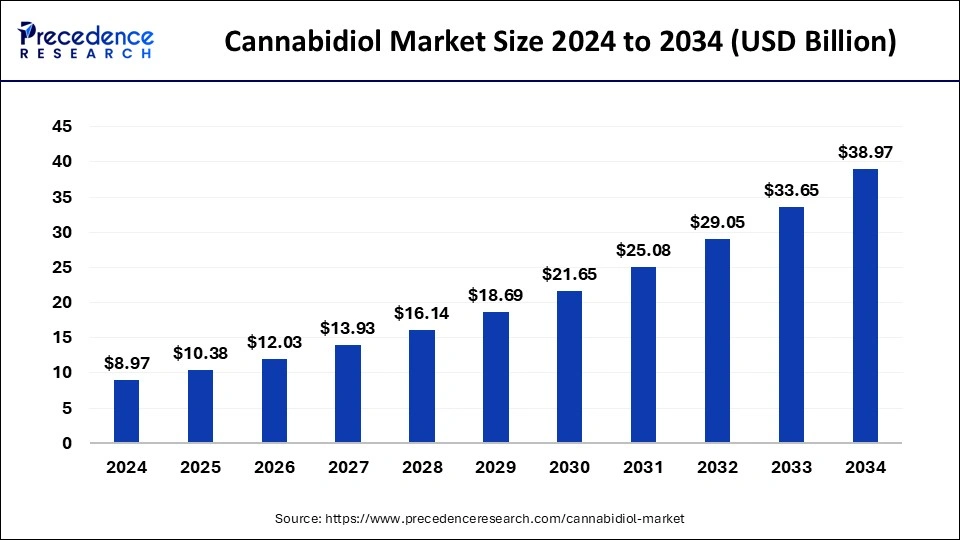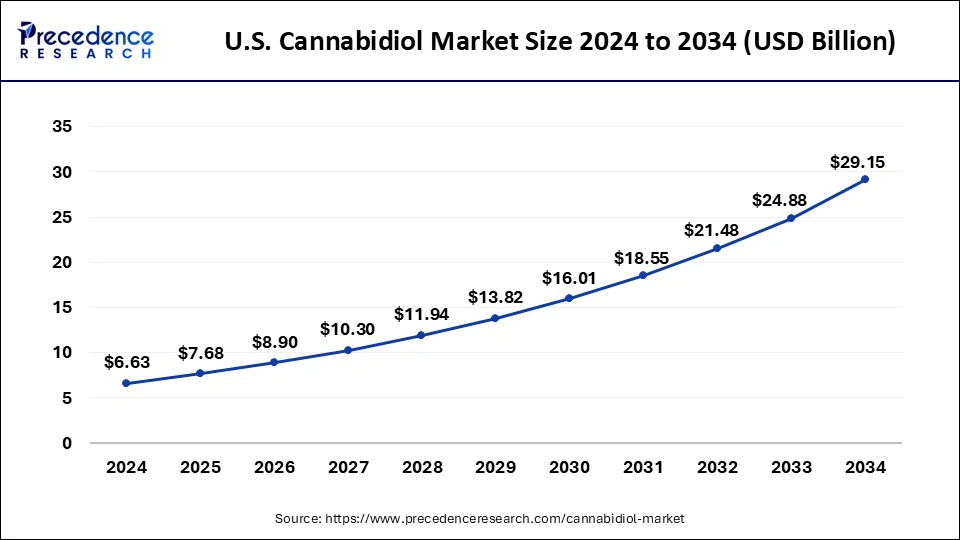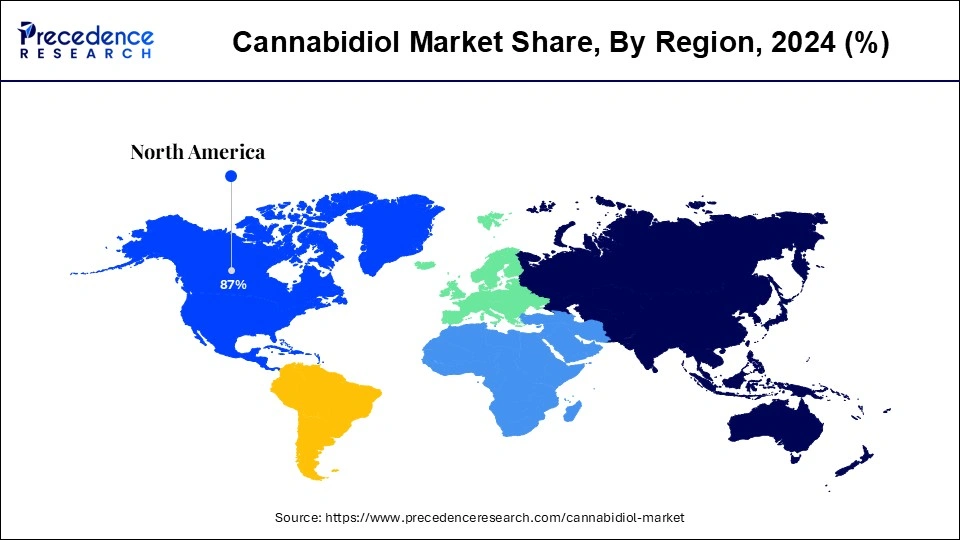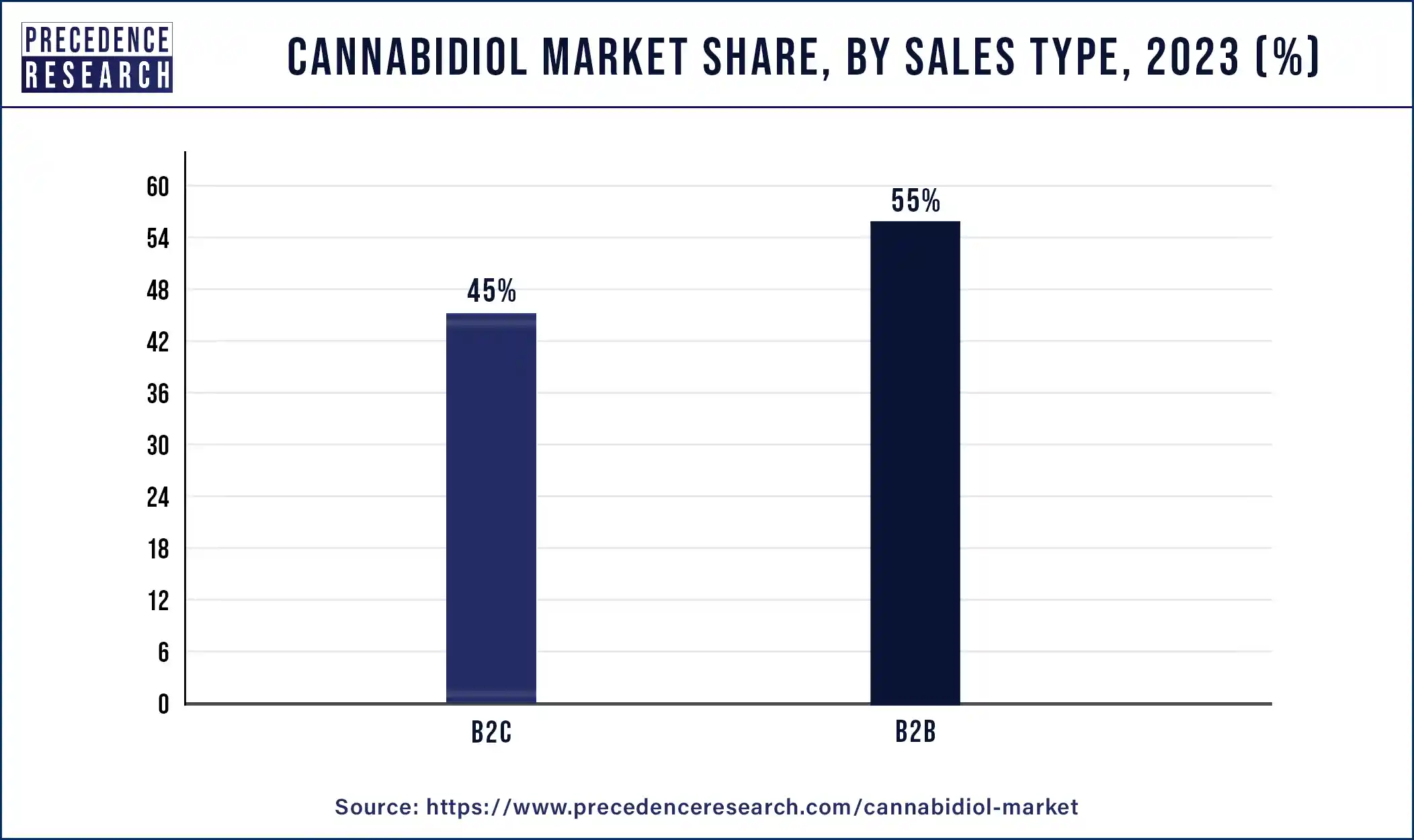The global cannabidiol market size accounted for USD 10.38 billion in 2025 and is forecasted to hit around USD 38.97 billion by 2034, representing a CAGR of 15.83% from 2025 to 2034. The North America market size was estimated at USD 7.80 billion in 2024 and is expanding at a CAGR of 15.90% during the forecast period. The market sizing and forecasts are revenue-based (USD Million/Billion), with 2024 as the base year.
The global cannabidiol market size was calculated at USD 8.97 billion in 2024 and is predicted to increase from USD 10.38 billion in 2025 to approximately USD 38.97 billion by 2034, expanding at a CAGR of 15.83%.

The U.S. cannabidiol market size was exhibited at USD 6.63 billion in 2024 and is projected to be worth around USD 29.15 billion by 2034, growing at a CAGR of 15.96%.

North America held the dominant market share of 87% in 2024, with products derived from cannabis sativa L. plant, commonly known as marijuana, gaining widespread attention. Advertisements tout CBD as a remedy for various ailments, driving its incorporation into an array of products, including massage oils, lotions, balms, makeup, and edibles. However, despite CBD's non-psychotropic nature, the presence of tetrahydrocannabinol (THC) poses challenges, as its consumption can yield positive drug tests and subsequent disciplinary actions.
Recent trends indicate shifting preferences, with sales of CBD products declining by 29 percent in Nevada in the first quarter of 2022. In contrast, sales of cannabinol (CBN) and cannabigerol (CBG) surged during the same period, reflecting evolving consumer preferences.

Cannabis has a complex history in America, including both utilization and criminalization. The legalization of marijuana for medical and recreational purposes in several states further shapes the cannabidiol market landscape, with California and Maine emerging as key hubs for medical marijuana users. Flower remains the most popular form of marijuana consumed by U.S. adults, with recreational facilities, friends, and medical dispensaries serving as primary distribution channels. Despite fluctuations in CBD sales, the North American market continues to evolve amidst regulatory changes and shifting consumer preferences.
Cannabidiol (CBD), a compound found in marijuana, has gained recognition as a non-impairing substance devoid of the psychoactive effects associated with tetrahydrocannabinol (THC). Derived from hemp or non-hemp plants, CBD has been notably utilized as an adjunctive treatment for managing seizures linked to Lennox-Gastaut syndrome or Dravet syndrome, as well as providing relief for moderate to severe neuropathic pain and other painful conditions, including cancer.
The legal landscape surrounding CBD underwent a significant shift with the passage of the Agriculture Improvement Act in 2018, which removed hemp from the federal Controlled Substances Act, effectively legalizing CBD derived from hemp at the federal level. However, variations in state regulations persist, with some states maintaining hemp under their controlled substances acts, leading to discrepancies in CBD product legality across jurisdictions.
Ongoing research trials continue to explore CBD's potential across various therapeutic areas, contributing to a growing body of evidence regarding its efficacy and safety profile. Despite regulatory complexities and evolving perceptions, CBD remains a promising agent in medical treatment, particularly for conditions such as Lennox-Gastaut syndrome, Dravet syndrome, and neuropathic pain.
Epidiolex, an FDA-approved medication containing purified CBD from hemp, stands as a notable milestone in CBD's pharmaceutical application. Recognized by the FDA as safe and effective for treating rare seizure disorders, Epidiolex represents a validated therapeutic option.
| Report Coverage | Details |
| Growth Rate from 2025 to 2034 | CAGR of 15.83% |
| Market Size in 2025 | USD 10.38 Billion |
| Market Size by 2034 | USD 38.97 Billion |
| Base Year | 2024 |
| Forecast Period | 2025 to 2034 |
| Segments Covered | Source Type, Sales Type, and End-use |
| Regions Covered | North America, Europe, Asia-Pacific, Latin America, and Middle East & Africa |
Real-world evidence
In the rapidly evolving healthcare landscape of CBD treatments, the surge of interest has outpaced scientific research and regulatory advancements, creating a murky terrain of misinformation and unverified claims. This environment poses significant challenges, particularly concerning product quality, dosages, and clinical guidelines, leading to skepticism among consumers and healthcare professionals alike. However, amidst these uncertainties, a beacon of hope emerges in the form of real-world evidence (RWE).
Derived from countries with robust regulatory frameworks, RWE offers invaluable insights into the efficacy, safety, and real-world outcomes of CBD treatments. By bridging critical gaps in knowledge and regulation, RWE not only addresses the pressing needs of patients and healthcare professionals but also serves as a driving force behind the growth and legitimacy of the cannabidiol market. Clinical evidence supporting CBD's efficacy in treating certain forms of epilepsy and providing analgesia in various conditions has fueled its adoption among patients seeking relief from persistent pain.
As the landscape of chronic pain management evolves, the cannabidiol market has emerged as a promising therapeutic service provider, garnering significant attention and driving growth in the market. CBD, derived from Cannabis sativa L., stands out for its non-psychoactive nature, making it an attractive alternative to traditional treatments containing tetrahydrocannabinol (THC). The growing acceptance is further fueled by ongoing preclinical and clinical studies, which continue to unveil CBD's potential across a spectrum of chronic pain conditions.
Enhanced therapeutic potential
The increasing recognition of cannabidiol as a potent treatment for intractable chronic pain across diverse conditions has propelled its prominence in the market. Supported by clinical evidence demonstrating efficacy in epilepsy treatment and analgesic properties, CBD's appeal lies in its non-psychoactive nature, distinguishing it from tetrahydrocannabinol (THC). As preclinical and clinical studies continue to unveil its potential in addressing chronic pain, the growth of the cannabidiol market surges, driven by rising demand for effective pain management solutions in various medical contexts.
Lack of regulation and potential contamination risks
Against the backdrop of increasing demand for effective pain management solutions, CBD's therapeutic promise has positioned it as a cornerstone in the evolving landscape of chronic pain treatment, driving robust growth in the cannabidiol market. However, a lack of regulatory framework combined with potential risks of contamination or incorrect labeling, especially in the healthcare sector, is a significant concern. These regulatory and safety concerns act as barriers to the growth of the market, limiting consumer confidence and adoption.
Despite the increasing popularity of hemp and CBD products, a significant restraint lies in the lack of FDA regulation. In the cannabidiol market, this absence of oversight exposes consumers to potential risks, as products labeled as hemp or CBD may inadvertently contain THC or other contaminants, such as heavy metals, bacteria, pesticides, or fungi. Moreover, the presence of THC in certain products can lead to psychoactive effects and adverse events, highlighting the importance of consumer awareness and vigilance.
Potential risks for pregnant and breastfeeding women
Among the burgeoning interest in CBD products, a significant restraint emerges concerning their safety for pregnant and breastfeeding women. The lack of clarity regarding potential contaminants in CBD products poses risks to fetal and infant health, urging caution and avoidance of use during pregnancy and lactation. With a limited understanding of the health effects associated with CBD use during pregnancy, consumer confidence wanes, hindering the growth potential of the cannabidiol market.
Unveiling CBD's therapeutic potential in neurological diseases
The expanding horizon of research on CBD's therapeutic applications in neurological illnesses presents a significant opportunity for the cannabidiol market. As future research endeavors aim to overcome obstacles and fully harness CBD's potential, optimism surrounds its transformative impact on medicinal practices and patient outcomes. Especially in the neurology sector of the healthcare industry, CBD's therapeutic potential is examined in neurological diseases.
CBD, distinguished as a non-psychoactive component of cannabis, emerges as a promising therapeutic agent in neurology, supported by extensive studies. Its multidimensional role in controlling neurotransmitter release, mitigating oxidative stress, and exerting anti-inflammatory actions underscores its versatility in addressing neurological disorders. With ongoing exploration and validation of CBD's efficacy, the market stands poised to capitalize on the growing therapeutic potential of CBD, driving substantial growth opportunities within the cannabidiol market.
The hemp segment, in 2024, asserted dominance in the cannabidiol market, driven by its definition as any part of the cannabis sativa plant containing no more than 0.3% THC. Notably, 9% of respondents exclusively use hemp-derived CBD due to its lower THC content compared to CBD from cannabis. However, regulatory challenges loom large, with Colorado struggling to manage the regulatory abyss surrounding industrial hemp. Unlike medical marijuana, industrial hemp falls outside stringent regulations, leading to quality and concentration concerns in both marijuana and hemp extracts. Despite these hurdles, the federal government's hands-off approach to states with legalized retail marijuana fosters an environment where the Colorado Department of Agriculture oversees hemp regulation, propelling market growth.
In the cannabidiol market, the B2B segment stands out as the dominant force, with hemp-derived CBD wholesale emerging as an enticing option for retailers. The surging demand for cannabidiol is evidenced by one in seven Americans being CBD consumers. Moreover, with the rise of CBD wholesale companies marketing products online, sales are forecasted to skyrocket in 2023. The abundance of distributor opportunities for hemp-derived CBD, not limited to oils, allows resellers to select specific product types tailored to their target market. Additionally, mass retailers are seizing the opportunity to rejuvenate their brands by incorporating CBD products, thus contributing to the continued growth of the market.

According to a recent Gallup poll, CBD presents lucrative opportunities for resellers. The diverse range of product options, including tinctures, vape oils, and topical salves, further amplifies the profit potential for CBD resellers. Projections from Brightfield Group analysts indicate a staggering 706% year-over-year growth in CBD sales in the United States, reaching approximately $5 billion this year alone.
The pharmaceuticals segment held the largest share of the cannabidiol market in 2024. In the pharmaceutical sector, cannabidiol stands as a prominent chemical derived from the Cannabis sativa plant, commonly known as cannabis or hemp. While one specific form of CBD is FDA-approved for treating seizures, it's important to note that CBD is primarily obtained from hemp, which contains minimal THC. CBD exhibits distinct effects on brain chemicals compared to THC.
In the cannabidiol market, although only prescribed for seizure disorders, CBD is also utilized for various conditions such as anxiety, pain, dystonia, Parkinson's disease, and Crohn's disease, despite limited scientific evidence supporting these uses. Non-regulated CBD products are widely used for self-treatment, driven by perceived health benefits lacking robust scientific backing. The efficacy of CBD is often attributed to its diverse biological targets, although concrete evidence primarily stems from observations rather than controlled clinical trials.
By Source Type
By Sales Type
By End-use
By Geography
For inquiries regarding discounts, bulk purchases, or customization requests, please contact us at sales@precedenceresearch.com
No cookie-cutter, only authentic analysis – take the 1st step to become a Precedence Research client